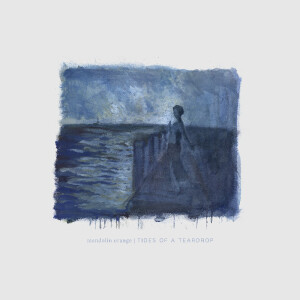 Mandolin Orange, of Chapel Hill, North Carolina, is one of the most prolific of current Americana acts. Tides of a Teardrop is their sixth since their debut in 2010 with Quiet Little Room, all featuring songs written by Andrew Marlin and sung by Marlin and Emily Frantz. It’s the first of their albums to feature a full band, and had a longer gestation than any of their previous releases, due to the deeply personal and cathartic nature of Marlin’s songs this time around.
Mandolin Orange, of Chapel Hill, North Carolina, is one of the most prolific of current Americana acts. Tides of a Teardrop is their sixth since their debut in 2010 with Quiet Little Room, all featuring songs written by Andrew Marlin and sung by Marlin and Emily Frantz. It’s the first of their albums to feature a full band, and had a longer gestation than any of their previous releases, due to the deeply personal and cathartic nature of Marlin’s songs this time around.
Marlin’s mother died when he was fairly young, and he’s been musically working out his grief and loss all along, but the songs on Tides deal with the topic most directly, starting with the opening track, which is the album’s second single, “Golden Embers.” It’s addressed to his father, and reaches out a hand in an offer to share their grief as they also work to keep her memory alive in their hearts. Frantz’s Celtic-influenced fiddling adds perfect flourishes that highlight the song’s emotions without descending to cliché. The full band joins in for the reprise verse, the bass, drums and churchy organ bringing a hopeful feel to the proceedings.
The first single, released last September, was the album’s final track, a staid waltz called “Time We Made Time,” in which Marlin seems to find some healing in the prospect of moving on, knowing that his missing loved one will always somehow be available to advise and nurture him.
This duo works out human grief and longing through all 10 songs here. Some portray people handling their woes in all the wrong ways, like the woman in “When She’s Feeling Blue,” a slow, sad ballad of a relationship that’s being devastated by depression; or the guy in “Late September,” who hits the bars every night in the fall when memories of his time of loss come around again, bottling up his tears and finding release only in another bottle; and especially in the superb honky-tonk shuffle of “Lonely All The Time.”
A couple of the songs use imagery from the animal world, like “The Wolves” (full of superb baritone guitar and warm mandolin lines), which portrays the wolf as a heroic matriarchal figure and also as metaphor for someone working out their emotions by howling at the moon; and “Mother Deer,” a sad old-timey waltz about an orphan too young to know its mother isn’t going to return.
Emily sings lead on a couple of tracks, the somewhat hopeful “Into The Sun,” a steady country march; and the ineffably downbeat “Like You Used To,” a bluegrass-tinged plea to move beyond crippling emotional pain and return to the days of early love.
The album’s title comes from the chorus of the penultimate track, the bluegrass gospel “Suspended In Heaven.” It’s a truly hopeful song with a mournful base, in the tradition of (and drawing imagery from) both “Will The Circle Be Unbroken” and “The Precious Jewel.”
“We’ve been working on these new tunes over the last few years and can’t wait to share them with you,” Marlin and Frantz say on their website. “We feel like so many of the songs that came before this were stepping stones toward this album.”
Mandolin Orange will be touring the U.S.A in February and March, then on to the U.K. and Europe in May. Tour dates and more information are on their website.
(Yep Roc, 2019)
